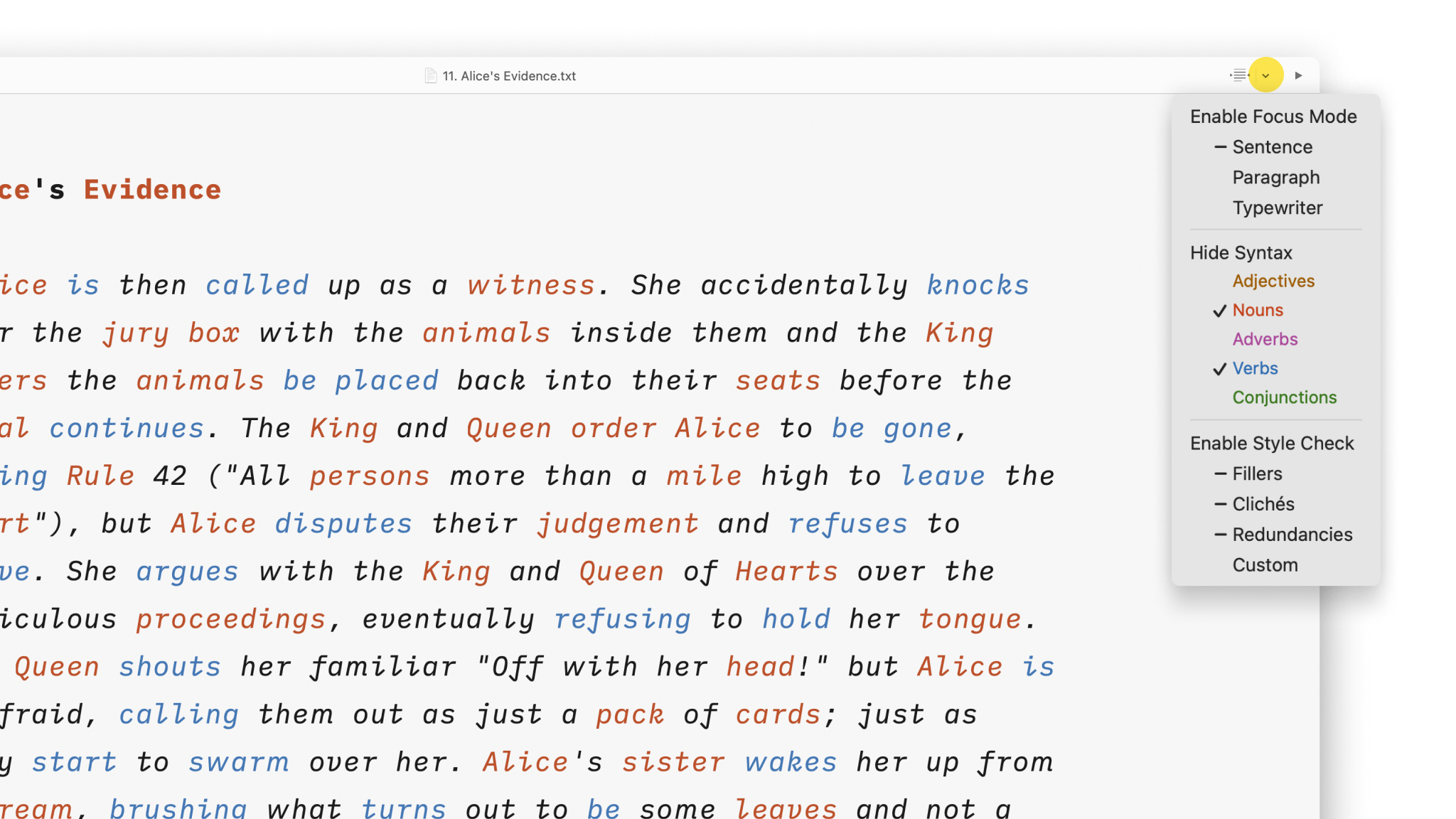Programmers use syntax highlighting to improve their code. Highlighting syntax gives them a more structured view of their code and helps them spot typos. Can highlighting adjectives, adverbs, verbs, nouns, and conjunctions improve your writing style too?
All writers make mistakes. Stephen King believes that fear makes us blind to our writing errors:
I’m convinced that fear is at the root of most bad writing. If one is writing for one’s own pleasure, that fear may be mild—timidity is the word I’ve used here. If, however, one is working under deadline—a school paper, a newspaper article, the SAT writing sample—that fear may be intense.
The fear of writing crap creates a bias that hides the mistakes from your consciousness. A tool that highlights parts of speech will counter this bias. Everyone can use help with highlighting parts of speech, because everyone fears writing.
“The Adverb Is Not Your Friend”
If you care about writing, you need to treat adverbs like monsters. When it comes to monsters and writing Stephen King has the best tips:
Adverbs, you will remember from your own version of Business English, are words that modify verbs, adjectives, or other adverbs. They’re the ones that usually end in -ly. Adverbs, like the passive voice, seem to have been created with the timid writer in mind. With the passive voice, the writer usually expresses fear of not being taken seriously; it is the voice of little boys wearing shoe polish mustaches and little girls clumping around in Mommy’s high heels. With adverbs, the writer usually tells us he or she is afraid he/she isn’t expressing himself/herself clearly, that he or she is not getting the point or the picture across.
Kill the adverb monsters. Then kill the adjective monsters.
“Write with Nouns and Verbs, Not with Adjectives and Adverbs”
Loved by the amateur, hated by the experienced writer, and handled with delicacy by the pro, the adjective is one of the cheapest and yet most expensive stylistic element in writing. Handled Carefully, it will make your writing shine and make it classy. Throwing adjectives about without care can cost you dearly.
“Write with nouns and verbs, not with adjectives and adverbs. The adjective hasn’t been built that can pull a weak or inaccurate noun out of a tight place. This is not to disparage adjectives and adverbs; they are indispensable parts of speech.”–Strunk & White
If you care about grammar you will notice that writers and writing teachers diss adjectives and adverbs with adjectives and adverbs:
“Adjectives are frequently the greatest enemy of the substantive.” – Voltaire
“Use no superfluous word, no adjective, which does not reveal something.” – Ezra Pound
“[Whoever writes in English] is struggling against vagueness, against obscurity, against the lure of the decorative adjective.” – George Orwell
“[I was taught] to distrust adjectives as I would later learn to distrust certain people in certain situations.” – Ernest Hemingway
“The adjective is the banana peel of the parts of speech.” – Clifton Paul Fadiman
“[The adjective] is the one part of speech first seized upon and worked to death by novices and inferior writers.” – J.I. Rodale
“When you catch an adjective, kill it. No, I don’t mean utterly, but kill most of them—then the rest will be valuable. They weaken when close together. They give strength when they are wide apart.” – Mark Twain
“Most adjectives are also unnecessary. Like adverbs, they are sprinkled into sentences by writers who don’t stop to think that the concept is already in the noun.” – William Zissner
In the examples above, only one author managed to completely avoid adjectives and adverbs. Can you spot it? Friends of the adjective and the adverb cry foul and accuse critiques of “Do as I say, not as I do”. If you go through the above examples you will see that the adverbs and adjectives used by masters carry meaning. What they oppose is adjectives that bloat. Strunk and White do not oppose a grammatical category, they oppose unnecessary words. There are three solid reasons to delete adjectives:
- Write only when you have something to say—do not inflate the void with plastic flowers
- Do not tell the reader how to feel, make them feel it themselves
- Set every word with both purpose and emotion
And this leads to an often misunderstood rule. When you read handbooks about writing you’ll often encounter the rule that you should avoid repetition, especially when it comes to nouns.
Repeat Nouns Consciously
Letters repeat, words repeat. When we speak we use identical words over and over. There’s is nothing wrong with that. On the contrary: Avoiding repetition at all costs will destroy your voice. Using the right word depends on whether:
- You know what you are doing
- You feel what you are doing
- You mean what you say
Repetition strengthens the structure if it is constructed consciously and with emotion. It can be applied as a rhetorical device. In the same way, fear will hide our mistakes from our eyes and hearts, while unwanted repetition will slip past the cracks and turn your text into a word mill. Nouns are the subject and object of your speech. If you speak or write coherently, you are forced to use and reuse the same nouns and names. Highlighting your nouns will help you find its nominal structure and unwanted repetition. Unwanted repetition creates unwanted coherence—and that leads us to the last but not least part of speech…
Conjunctions Seem Harmless…
…but you may have heard that you should avoid starting a sentence with it. But why not, you may ask? “But” is only one out of a series of coordinating conjunctions that you need to hande with care. There are more:
| Conjunction | List |
|---|---|
| Coordinating | for, and, nor, but, or, yet, so Remember with the acronym FANBOYS. |
| Subordinating | A : after, although, as, as if, as long as, as much as, as soon as, as though B : because, before, by the time E : even if, even though I : if, in order that, in case L : lest O : once, only if P : provided that S : since, so that T : than, that, though, till U : unless, until W : when, whenever, where, wherever, while |
| Correlative | both… and either… or neither… nor not only… but also whether… or |
Conjunctions join words, phrases, and clauses. Therefore p Putting conjunctions at the beginning of a sentence needs to be done with heart and mind. The worst thing you can do with them is—you guessed it—using them without mind or heart, using them without thinking or caring about them, using them without meaning them. When you apply conjunctions they must echo logic. Good thinking is logical. Fake logic is one of the hardest things to spot. Let’s start with an easy example:
I think you are wrong. Therefore, I’m right.
What’s wrong with “therefore”? Unless used with intentional humor, “therefore” requires a stringent logic beyond a reasonable doubt. “I think you are wrong therefore I’m right.” is far from logical. “I am right” needs more proof than, “I think you are wrong.” A lot of these mistakes go back to logical fallacies like:
| Fallacy | Form |
|---|---|
| False Dilemma | If A is not always true, then A must always false. |
| Correlation is Not Causality | A happened after B, therefore A caused B. |
| Argument from Ignorance | A is true because A has not been proven false. |
| Appeal Authority | A is true because good C says A. |
| Guilt by Association | A is bad because bad D believes A. |
| Argument from Consequence | A is true because if it were false that would be bad. |
| Appeal to the Bandwagon | A is true because many say it’s true. |
Most often, conjunctions are just put in sentences without any connection at all.
He was quite tall, however, I never thought that he was particularly smart
Being tall and being smart are completely unrelated. Pointing out examples may sound sounds funny, but we often use false connectors unknowingly. When we speak we use them as fillers or to communicate coherence. In writing, we need to be more careful. The literal word cannot hide behind tone and apply to logical benevolence.
To Be or Not to Be Is Not the Question: Pump up the Jam!
The verb “to be” is weak because it only conveys existence, but doesn’t show movement. Weak verbs indicate passive voice and nominal style. Avoid them. Weak verbs are lame take the dynamic out of freeze the sentence. They lead to paint a static image dominated by nouns, “has” and “is”. “Use strong verbs, avoid weak verbs” is easier said than done. In practice, you will often end up rethinking the phrase and find a way to describe your thought through movements rather than describing a photograph.
| Weak Verb: Photo | Strong Verb: Movie |
|---|---|
| The lion was fighting with the antelope. | The lion attacked the antelope. |
| The people responsible for the disaster are still employed by Facebook. | The people that caused the disaster still work at Facebook. |
| The island was in an evolving state. | The island evolved. |
| I have questions for your teacher. | Please ask your teacher. |
| I have a call with her on Tuesday. | I will call her on Tuesday. |
| iA Writer is accomplishing more than you think. | iA Writer accomplishes more than you think. |
| Paris is the place where Federer never beat Nadal. | Federer never beat Nadal in Paris. |
| Nina has flowers in her garden. | Flowers grow in Nina’s garden. |
| Your writing is inspiring to a lot of people | You inspire a lot of people. |
| Retirement is in his plans for next year. | He plans to retire next year. |
The easiest way t To spot weak verbs, is to highlight them. It can be a shock when you see how many lame verbs you use. Don’t worry, help is on the way.
How Do I Catch Them All?
Code editors highlight code syntax. Highlighting code syntax helps coders understanding structure and spot structural mistakes. Highlighting parts of speech in a text editor is similar. iA Writer’s Syntax Highlight helps you spot stylistic errors such as bloat through adjectives and adverbs, illogical conjunctions, weak verbs and repetitive nouns. Try it.





